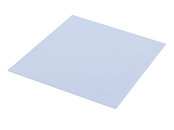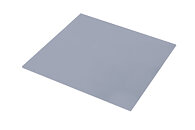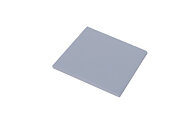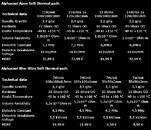Tuesday, July 20th 2021

Alphacool Announces Apex Soft & Rise Ultra Soft Thermal Pads
Today, Alphacool presents a new generation of thermal pads. The Alphacool Apex Soft and Rise Ultra Soft thermal pads can be compared thermal paste due to their outstanding properties and efficiency.
The Apex Soft and Rise Ultra Soft thermal pads fill up the unevenness of components significantly better than standard pads. As they can nestle between components better, heat transfer between the cooler and component is significantly increased. The softer consistency of the thermal pads also prevents taller components such as voltage converters or VRAM from being subjected to increased contact pressure from the cooler. The special material does not dry out as easily as standard thermal pads, allowing them to be used for a much longer period without any significant loss of performance.The Apex Soft is Alphacool's high-end solution for thermal pads and are offered with a thermal conductivity of 11 W/mk and 14 W/mk. The cost-effective Ultra Soft thermal pads of the Rise series will be available with a thermal conductivity of 7 W/mk.For more information, visit this page.
The Apex Soft and Rise Ultra Soft thermal pads fill up the unevenness of components significantly better than standard pads. As they can nestle between components better, heat transfer between the cooler and component is significantly increased. The softer consistency of the thermal pads also prevents taller components such as voltage converters or VRAM from being subjected to increased contact pressure from the cooler. The special material does not dry out as easily as standard thermal pads, allowing them to be used for a much longer period without any significant loss of performance.The Apex Soft is Alphacool's high-end solution for thermal pads and are offered with a thermal conductivity of 11 W/mk and 14 W/mk. The cost-effective Ultra Soft thermal pads of the Rise series will be available with a thermal conductivity of 7 W/mk.For more information, visit this page.





16 Comments on Alphacool Announces Apex Soft & Rise Ultra Soft Thermal Pads
I already own the previously launched Ultra Soft pads and use them on 6900XTU Liquid Devil Ultimate under the water block on VRAM and VRM.
www.alphacool.com/shop/waermeleitmittel/waermeleitpads/25889/alphacool-eisschicht-ultra-soft-waermeleitpad-3w/mk-100x100x1mm
These new ones have higher conductivity.
The Apex Soft are having high conductivity but are relatively hard with 72-80 Shore OO.
The Rise Ultra Soft are really soft with 25 Shore OO hardness, but has lower thermal conductivity of 7 W/mk.
Still these Rise Ultra Soft seem to have better thermal conductive than my Ultra Soft (3W/mk) ones that I currently use.
Most probably I will order both to test. :rolleyes:
On the secod thought the 14W/mk are damn expensive.:eek:
I will order first Rise Ultra Soft to check if I see some improvement on VRM temperatures at 460W GPU load under OC compared to my Ultra Soft ones. :laugh:
There are different thicknesses available.
The best fitting on the 6900XTU under EK Waterblock on the memory and VRM is the 1mm version.
@JayzTwoCents, you should do some testing in a video on these!
DE
www.igorslab.de/waermeleit-pad-tests-auf-der-nvidia-geforce-rtx-3080-vier-referenz-pads-und-brachiale-temperaturstuerze-des-heissen-gddr6x-bis-auf-50/
EN
www.igorslab.de/en/thermal-pad-tests-on-the-nvidia-geforce-rtx-3080-four-reference-pads-and-brachial-temperature-rise-of-the-hot-gddr6x-to-50/
Why did you even replace the original thermal pads on your Liquid Devil?
According to one of the most respectable tech YT channels (Igorslab, same guy who conducted the tests of Alphacool's pads), EKWB/PowerColor already use super soft 1mm 7W/mK pads on all Liquid Devil cards.
Due to OEMs / manufacturers being basically the same for most pads (which are only later branded by resellers like Alphacool) + the color resemblance, it's quite safe to assume they already WERE using the same pads on the Liquid Devil that Alphacool now sells as "Rise Ultra Soft 7 W/mK" in 1mm thickness.
That would mean you possibly swapped out the higher conductivity 7 W/mK original pads for the worse Ultra Soft 3 W/mK ones and purchasing the "Rise Ultra Soft" would only mean going back to the original pads :)The tests showed a very good comparison between different coductivity pads of the same reseller / brand. Igor already mentioned he will test more of the commonly used pads in the future, but he didn't have all of them available yet. What was done though was a test of the premium high conductivity pads from Alphacool (manufactured by Fujipoly) vs. Chinese OEM pads who claim the same conductivity, but fail to reach the same temperatures as Japanese products.
I could not get anywhere original ones, the closest was Ultra Soft. :rolleyes:
Now that Rise Ultra Soft is available with 7w/mK, I will replace Ultra Soft with Rise Ultra Soft. As a matter of fact I replaced them yesterday evening. :)
You may ask why did I apply LM. With original paste hotspot was hitting 93°C under 2750MHz@1175mV OC with 420W powet limit.
With LM the hotspot remains below 78°C. :D
I opened yesterday Liquid Devil again to flash with a bios from AMD XTXH-LC card using ch341a Programmer that has 18Gbps memory setting. While I was doing that I also changed the pads.
Tests will come soon. I need to build the card into PC tonight and test it. :D
I will past results later in Owner's thread.
Destroying the original pads explains why you'd use the 3 W/mK ones afterwards. Basically, you have now gone back to using the original pads (which are the exact same as the 1mm Alphacool Rise Ultra Soft 7 W/mK ones with 25 Shore OO).
I have both the original / Rise Ultra Soft 1mm pads as well as the 1mm Gelid GP-Extreme pads (12 W/mK 35 Shore OO) available and will test and compare this week.
To be honest, I don't believe the advertised 12 W/mK on the Gelid pads are even real. Igor has already shown that Chinese pads don't always live up to the advertised values. Chinese 14 W/mK pads performed considerably worse - over 10 K - than Alphacool's Fujipoly 14 W/mK pads.
I still hope the Gelid pads might at least perform slightly better than the original / Rise Ultra pads though.
Seems logical. Oh, wait...
It is still an objective comparison of measured VRAM temperatures using various thermal pads from the same reseller with different conductivity values. It shows the effects those different conductivity values have on the actual VRAM temperatures under standardized conditions as well as bottlenecks that might prevent absolute high-end pads from showing (more) positive effects.
Btw. the video still includes a test against a competitor, i.e. Japanese Fujipoly pads vs. Chinese OEM pads. Considering the fact that literally all resellers (or "name brands" as you'd call them) buy their pads from only 3-4 manufacturers, the test already covers relevant parts of world-wide competition.
You obviously can't cope with the fact that this is not your typical "buying advice" video, so you claim failure.